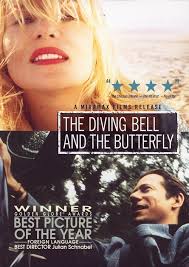| After suffering from a catastrophic stroke the charismatic, jovial and artistic editor of a world-renowned French magazine adapts to a life of immobility, speechlessness and impaired sight. Jean-Dominique Bauby, the editor of a fashion publication, suddenly finds his world turned upside down. While driving in the picturesque countryside, he suffers a catastrophic stroke that will change the rest of his life. The movie follows Jean’s journey in a rehabilitation center as he faces daily struggles to retain his individuality, solely, through the communication of one eye. The Diving Bell and the Butterfly provides unique insight, through a first-person view, of the pain, sorrow and joy experienced by a patient suffering from locked-in syndrome. |
Neuropsychological Review
Trapped in my Mind
Justin W. White
Cognitively alert, you can think, you can see, but you can’t move a thing, and as a result, you are unable to communicate through verbal or motor means, effectively placing a human being in a tomb of flesh (Kobert, 2008). This unimaginable experience is the stark reality for patients who experience a condition known as ‘locked-in syndrome.’ In The Diving Bell and the Butterfly (based on the book The Diving Bell and the Butterfly: A Memoir of Life in Death by Jean Dominique Bauby), Mathieu Amalric plays the role of Jean-Dominique Bauby, the editor of a trendy French magazine who suddenly experiences a stroke (cerebrovascular accident, CVA).
Trapped in my Mind
Justin W. White
Cognitively alert, you can think, you can see, but you can’t move a thing, and as a result, you are unable to communicate through verbal or motor means, effectively placing a human being in a tomb of flesh (Kobert, 2008). This unimaginable experience is the stark reality for patients who experience a condition known as ‘locked-in syndrome.’ In The Diving Bell and the Butterfly (based on the book The Diving Bell and the Butterfly: A Memoir of Life in Death by Jean Dominique Bauby), Mathieu Amalric plays the role of Jean-Dominique Bauby, the editor of a trendy French magazine who suddenly experiences a stroke (cerebrovascular accident, CVA).


 RSS Feed
RSS Feed

